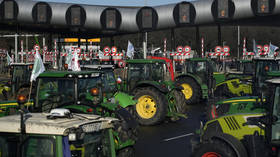Brussels’ position on cheap imports is unacceptable, the Solidarity trade union declared
Polish farmers will block border crossings with Ukraine during a general strike planned for next week, the Solidarity trade union announced on Thursday.
In addition to making Ukrainian crossings impassable, the union plans intermittent road blockades across Poland to last through March 10, it said.
“Our patience has run out. Brussels’ position on the last day of January 2024 is unacceptable for our entire agricultural community,” the union said in a statement, referring to Thursday’s EU summit, which was loudly protested by farmers from across the bloc.
“The inaction of the Polish authorities and plans to cooperate with the European Commission and respect all its decisions regarding the import of agricultural products and food from Ukraine leave us no choice but to announce a general strike,” Solidarity added. It requested that Polish citizens respect the union’s struggle for what it framed as the “common good” of the nation.
Farmers across Germany, France, the Netherlands, and many other EU countries have turned out to protest in recent weeks, citing the bloc’s “green” climate policies targeting agricultural producers with price hikes on fuel, as well as the cheap Ukrainian imports flooding their domestic markets.
They converged on Brussels with over 1,300 tractors during the EU summit this week, throwing eggs, rocks, and fireworks at the EU Parliament building and setting huge piles of manure on fire.
The European Commission outraged farmers with its proposal on Thursday to extend the suspension of customs duties on agricultural goods from Ukraine and Moldova through 2025. Brussels had initially justified dropping the tariff in 2022 as a means of supporting Kiev during the conflict with Russia, and the suspension was previously scheduled to expire this year.
Polish farmers initially took to the streets last year to protest the cheap Ukrainian imports that have driven prices down and imperiled their livelihoods. Polish truckers joined the protests, claiming they too were being undercut by their Ukrainian counterparts. Along with Hungary, Romania, Bulgaria, and Slovakia, Poland moved to ban imports of Ukrainian grain in May.
A separate protest by another group of farmers and truckers blocking a key border crossing with Ukraine ended earlier this month when Warsaw capitulated to the protesters’ demands, which included reinstating a permit system for Ukrainian truckers, adopting government subsidies for Polish corn, and a moratorium on tax hikes.
After weeks of farmer protests across Europe, European Commission President Ursula von der Leyen held a “strategic dialogue” with community and business leaders in Brussels last week in an effort to find “common and lasting solutions” for European agriculture. However, critics highlighted a lack of farmer representation at the meeting.


